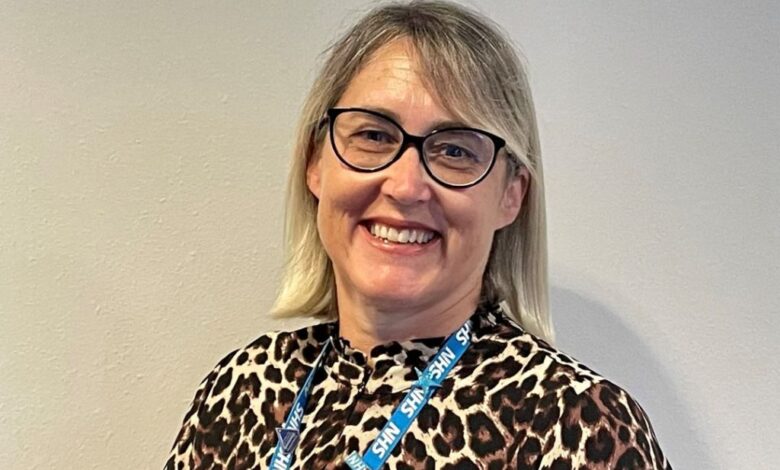Nurse leader places focus on international staff retention

A senior nurse has presented the results of a drive at her trust to improve the retention and career progression of internationally trained nurses.
Kathryn Burn, director of quality and deputy director of nursing at County Durham and Darlington NHS Foundation Trust, ran the project over the last two years as part of her Florence Nightingale Foundation Leadership Scholarship.
The aim was to reduce turnover rates at her trust – particularly among international nurses.
“My primary driver is to make sure we have the right staff with the right skills to deliver care”
Kathryn Burn
Ms Burn said that, when she applied for her FNF scholarship in November 2021, the nursing turnover rate was at 11%; this, by March 2023, fell to 8.8%. She was “confident” the steps she took made an impact.
These included the expansion of the trust’s nursing recruitment and onboarding team, expanding its preceptorship offer and introducing an “accelerated” scheme, and improving career coaching including from peers.
This project, she explained, had two ambitions: improve retention among all staff, and support international nurses’ career progression.
Between 2020 and March 2023, the trust recruited 340 overseas-educated nurses and intended to bring in a further 100 by the end of the year.
“It was important for me to not just focus on recruitment, but support and retain them too,” said Ms Burn.
“Workforce is part of my portfolio as deputy director of nursing, and included in that is training priorities.”
She aimed to ensure the trust recognised the diversity of knowledge, skills and experiences internationally educated nurses arrived with and help address any gaps or insecurities they had in their transition into the NHS – an issue international nursing and midwifery associations (INMAs) have been speaking about frequently this year.
Ms Burn noted that analysis the trust had carried out into staff training needs had showed that for international nurses, “their education needs might be different”.
To address this, Ms Burn used her FNF project as a way to leverage funding for a new preceptorship lead position, and a post in the staff education team for a matron-level nurse.
Both of these teams have also had other band 6 and 7 nurses added to their rosters, as part of Ms Burn’s plans to increase the support for these key areas of recruitment and retention.
Ms Burn also negotiated an arrangement with the trust’s local university to allow access to its clinical skills area. This, she said, allowed better development for the workforce, especially internationally trained nurses.
“We have an extensive range of training and education courses that we have built over the last year using our continued professional development (CPD) funding, and [this] has been developed based on feedback received from our training needs analysis,” she said.
“Furthermore, we have carried out some bespoke surveys with our internationally educated staff to tailor our learning and development opportunities appropriately.
“We have monitored the uptake on the courses available and supported with local conversations to demonstrate and showcase courses available to support both clinical and leadership development opportunities.”
INMAs have also, this year, been vocal about the issue of the under-banding of internationally trained nurses.
Ms Burn, hoping to ensure everyone at her trust is working at the top of their proficiency, has used her FNF scholarship as a vehicle to develop an accelerated preceptorship programme.
The accelerated programme is for nurses who are new to the trust but not necessarily new to nursing, such as international recruits, and aims to support faster progression.
Explaining further, Ms Burn said: “As a result of Covid, preceptorship didn’t get as much of a look in as it did before, but now there has been a massive focus around getting it right.
“At the same time as [giving them extra support], I didn’t want to segregate international nurses; I want our nurses to work and train together as much as possible while not discounting their different needs.
“The accelerated programme is also for nurses qualified in another organisation.”
Ms Burn has ensured an additional band 7 worker was recruited to support this scheme.
In addition, Ms Burn referred to a nationwide initiative, known as Stay and Thrive, which she led on in her region as part of her leadership scholarship.
Stay and Thrive aims to improve internationally educated nurse retention via improving pastoral support and streamlining the integration process.
“[We have utilised] this to influence locally to enable us to support and retain all our nurses with a greater focus on those who have been educated internationally and recently we have been successful in achieving the NHS Pastoral Care Award,” Ms Burn added.
“Our internationally educated nurses are a fundamental part of our workforce”
Jeremy Cundall
The deputy director of nursing said that the “greatest educational success”, however, was a new leadership programme at the trust.
This multi-professional 10-day course provides those who wish to climb the Agenda for Change banding ladder to become leaders with the skills to do it, including those trained overseas who have joined the County Durham trust.
Looking ahead, Ms Burn said her team was leading on a ‘beyond preceptorship’ programme to ensure staff access ongoing education and development during their careers.
“For me, it’s about embedding what we have and making it sustainable,” she said.
“My primary driver is to make sure we have the right staff with the right skills to deliver care. If you give people the tools they can do it.
“Whilst the work has only started, this work will link closely with the NHS Long Term Workforce Plan.”
Jeremy Cundall, deputy chief executive at County Durham, said he was “very proud” of the work Ms Burn and her team had done, as part of her FNF scholarship.
“Our internationally educated nurses are a fundamental part of our workforce and play a crucial role in delivering excellent patient care – we are lucky to have them,” Mr Cundall said.
“We don’t underestimate that the transition for them, both personally and professionally, isn’t always easy.
“Our dedicated team, led by Kathryn, is committed to both their training and welfare – key to retaining them for the long term and ensuring they can achieve their potential with us.
“We are also committed to ensuring that like Kathryn, our valuable staff can grow and develop professionally through opportunities both internally and externally, such as the Florence Nightingale Foundation Senior Leadership Programme.”







